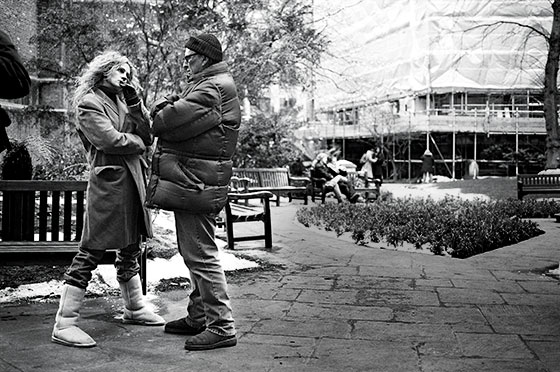 |
Mike Nichols and Julia Robers on the set of Closer in 2004.
(Photo: Brigitte Lacombe) |
The late director’s influence lives on in the actors and creators he nurtured, advised, and productively chastised. Four of them remember him.
Robert Redford: Barefoot in the Park [on Broadway in 1963] was, I believe, his first job directing a play. How he dealt with his nervousness had a lot to do with his sense of humor and his intellect. On opening night, he pulled the cast backstage and said, �Don’t worry, but just remember that everything depends on tonight.�
Julia Roberts: I met Mike for the first time at the Bel-Air hotel for breakfast to talk about Closer. I was so nervous that I was an hour early and sat in my car. I finally could wait no longer and went inside, where I literally ran right into him. He gave me his sweet smile and said, �You’re early. That’s cheating.�
Eric Idle: I was a huge fan of Nichols and May in college, but I didn’t know what he looked like because it was only audio. So I met this guy very early in the evening at a party at Paul Simon’s house. I spent two hours talking to him about everything. His conversation was about plays and literature and books and comics. Then someone told me, �Oh, that’s Mike Nichols.� Of course it was.
Natalie Portman: I remember Meryl Streep took us all to this Russian place to celebrate the opening [of The Seagull in Central Park]. Mike turned to me and said, �You know, someone at this table almost died of a drug-induced heart incident in the ’80s. Can you guess who it is?� And I was like, Chris Walken? No. John Goodman? No. Phil Hoffman? No. And I went around the entire table�Meryl?!�and he said, �It was me.� [Nichols spoke publicly about his addiction to the sleep aid Halcion.] He was so open about his flaws and his mistakes. I think it was part of his mentorship. Oftentimes, people are so ashamed of their mistakes they want to hide them and pretend to be perfect. He was the opposite. He was perfect, and he had to humanize himself.
Redford: That point in my life [going into Barefoot] was kind of a dark period. I wasn’t sure I wanted to act. I decided, I’m gonna sabotage this, I’m gonna make them fire me. I purposely didn’t learn lines�just really perverse stuff. Somebody else would have just let me go, but he said, �You’re gonna be in the play no matter what. You can just lie down on the stage, but I want you to be in the play.� Had I really won, it would have been a disaster. What a risky thing for him to do.
Idle: We had a little row before [Spamalot] rehearsals. He wanted to put something in and I said, �Look, I’m the writer, I put things in!� It was a territorial dispute. It was very healthy. For him, it was always: �The book, the book, the book.� Beautiful, funny�doesn’t matter. Are we advancing the story? Where’s the audience? Are we ahead of them? We should be.
Portman: Star Wars had come out around the time of Seagull, and everyone thought I was a horrible actress. I was in the biggest-grossing movie of the decade, and no director wanted to work with me. Mike wrote a letter to Anthony Minghella and said, �Put her in Cold Mountain, I vouch for her.� And then Anthony passed me on to Tom Tykwer, who passed me on to the Wachowskis. I worked with Milos Forman a few years later. He said, �Mike saved me. He wrote a letter so that I could get asylum in the U.S.� He did that for 50 people, and it doesn’t make any one of us feel less special.
Idle: He was fabulous on actors. He would make grown men cry. And then make them lie on their backs and just say the words. Just talk to each other and listen. He taught an acting class for nothing every week.
Roberts: The first day of shooting [Closer] was a scene with Jude Law and myself. Our characters meet for the first time and end up in an embrace. The scene was complex. Two days later, Mike called us into a room and said we had done it all wrong. It felt like such inspiration�strangely. We reshot the scene, and like children we were so excited to have a second chance. He was filled with pride for us.
Portman: When I was 25, I had my heart broken�the rupture of my adolescence, the big heartbreak. I was at his apartment on the floor, and he picked me up and gave me a pep talk and sent me to a doctor and straightened me out�literally peeled me off the floor.
Redford: At one point he said to me, �There’s something you have inside you that’s yours and yours alone. Be with that, just take it onstage.� I didn’t know quite what that meant. But I did something once. I didn’t say my lines�I just started humming. The actress I was working with got really freaked out. But something clicked when I saw how alive the moment was. Boom, that was it. He just saw the way to get me through it.
Portman: When he would see something that he loved, he would say, �It’s like life.� I think he meant that it had this combination of darkness and joy and strangeness. I think people as intelligent as him are often blighted with sadness, but he really was so content. I don’t know anyone else like that�to be the smartest person that ever was and also be so happy.